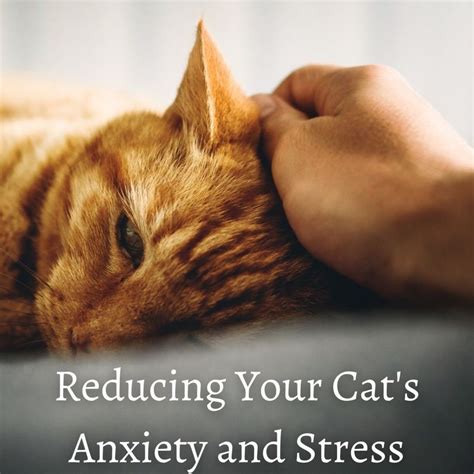Introduction
Anxiety is a common feline companion stemming from an array of environmental, behavioral, and physiological factors. Among these, nutrition plays a pivotal role in managing anxiety levels, offering a holistic approach to feline well-being.

The Physiology of Cat Anxiety
Approximately 13% of cats experience anxiety, manifesting in various forms, including:
- Behavioral signs: Hiding, pacing, vocalization, inappropriate elimination
- Physiological signs: Increased heart rate, panting, trembling, dilated pupils
Stress triggers release hormones that affect nutrient absorption and metabolism. Chronic anxiety can impair digestive function, nutrient absorption, and immune response.
Exploring the Nutritional Link
1. Calming Nutrients:
Certain nutrients possess inherent calming effects:
- Tryptophan: An amino acid converted to serotonin, a neurotransmitter associated with mood regulation.
- Valerian root: An herb containing valerenic acid, which binds to GABA receptors, promoting relaxation.
- Chamomile: A herb containing flavonoids with anti-anxiety properties.
2. Calming Diet Ingredients:
Specific diet ingredients can contribute to anxiety reduction:
- Hydrolyzed protein: Broken-down proteins that reduce allergic reactions, a common anxiety trigger.
- Prebiotics and probiotics: Beneficial bacteria that support digestive health, reducing stress-related gastrointestinal issues.
- Omega-3 fatty acids: Found in fish oil, these essential fatty acids reduce inflammation and anxiety.
Effective Strategies
1. Reduce Stressful Mealtimes:
- Create a calm and quiet feeding environment.
- Avoid sudden movements or loud noises.
- Divide large meals into smaller portions.
2. Enhance Sensory Stimulation:
- Add puzzle feeders or enrichment toys to mealtimes.
- Use interactive food bowls that encourage hunting behavior.
- Vary food textures and flavors to stimulate interest.
3. Tailor Nutritional Requirements:
- Consult a veterinarian to determine individual nutritional needs.
- Choose diets specifically designed for anxious cats.
- Consider supplements containing calming nutrients.
Common Mistakes to Avoid
1. Feeding Inappropriate Treats:
Avoid giving anxious cats treats high in sugar or artificial ingredients, which can exacerbate anxiety.
2. Overfeeding:
Obesity can contribute to anxiety by increasing physical discomfort and inflammation.
3. Ignoring Medical Conditions:
Underlying medical conditions, such as hyperthyroidism or irritable bowel syndrome, can mimic anxiety symptoms. Consult a veterinarian for proper diagnosis and treatment.
FAQs
1. What are the best food choices for anxious cats?
Prescription diets, hydrolyzed protein formulas, and diets rich in calming ingredients are recommended.
2. Should I give my anxious cat supplements?
Supplements containing tryptophan, valerian root, or chamomile may provide additional support. However, always consult a veterinarian before administering supplements.
3. How long will it take for nutritional changes to show results?
Results may vary depending on the cat’s individual response. However, gradual improvements can be observed within a few weeks.
4. How can I tell if my cat’s anxiety is improving?
Signs of reduced anxiety include increased relaxation, decreased hiding, and improved appetite.
5. Can wet food help with cat anxiety?
Wet food can provide hydration and reduce anxiety by promoting satiety.
6. Is it okay to feed my anxious cat homemade food?
Homemade food can be a viable option, but it is crucial to ensure it meets the cat’s nutritional requirements and is not overly processed.
Highlights and Standout Features
1. Holistic Approach:
Nutrition is an integral part of managing cat anxiety, complementing other behavioral and environmental interventions.
2. Personalized Dietary Needs:
Dietary recommendations should be tailored to the individual cat’s anxiety levels, underlying medical conditions, and lifestyle.
3.循证医学证据:
The nutritional strategies discussed are supported by scientific research and have demonstrated efficacy in reducing feline anxiety.
Call to Action
If you suspect your cat is experiencing anxiety, consult a veterinarian to rule out underlying medical conditions and develop a comprehensive treatment plan. By implementing nutrition-based strategies, you can provide your feline companion with the support they need to live a more relaxed and fulfilling life.





















